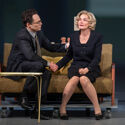
Ugandan Ethics and Integrity Minister James Nsaba Buturo just got a special delivery. No, this one’s not an emailed “death threat” from a gay activist.
It’s an open letter from Opiyo Oloya, a Ugandan journalist living in Canada. Though Oloya usually writes on music, he takes a political spin with this evisceration of Buturo’s anti-gay ways. He also gives us all a lesson in deadpan delivery.
Consider Oloya’s description of his gay introduction:
At Queen’s University in Kingston, about two and half hour drive from Toronto, I became aware of an organisation called the Queen’s Homophile Association (QHA). When I asked fellow students what the organisation was about, I was told that it supported homosexuals, bisexual and transidentified individuals to live openly and positively with their sexual orientation.
…
I did not know what all those terms meant. Imagine my horrors when it was explained to me that members of QHA were young men and women who were attracted to their own gender rather than the opposite sex. I was thoroughly confused, disgusted, and very scared.Nothing in my upbringing in Pamin-Yai village, west of Gulu town had prepared me for what I saw as an abomination to society. I was afraid that, alone in this twisted new world, I might become a victim of these strange people who could hurt, worse, make me a member of their group.
Sure, the gay glitter can be a bit disconcerting, perhaps even a bit frightening, but under all that sinister shine, Oloya writes, there may be something of actual value and – gasp! – respect.
Coming out was the most radical statement a gay person could make at the time, namely, telling family, friends and the larger society that he or she was homosexual. In the meantime, reports of incidences of violence against homosexuals became routine in Canadian media. Interestingly, I cannot recall any headline about homosexual violence against heterosexuals.
Gays, it seemed, adopted a Gandhi-like approach to unprovoked violence-fight hatred with love. They refused to be pushed into violence. Instead, they used the legal system to claim their charter rights to be treated equally with dignity as human beings.
Savvy activism also allowed gays to come across as open-minded and tolerant individuals, which translated into wider acceptance in society. Today in Canada, gays are our neighbours, our co-workers, our Members of Parliament, our police officers, and so forth. Not surprisingly, on Saturday, June 24, here in Toronto, the 27th Annual Pride Parade mounted by gays and lesbians attracted thousands of people worldwide including some of Canada’s leading politicians. The event pumped an estimated $80m to the local Metro Toronto economy.
As such money-generating, generally peaceful people, the gays eventually won Oloya’s heart. If only the good ethics ministers Buturo could find it in his heart – and the ethics – to accept them.
How about we take this to the next level?
Our newsletter is like a refreshing cocktail (or mocktail) of LGBTQ+ entertainment and pop culture, served up with a side of eye-candy.
As for those alleged death threats, Oloya thinks its some hater breeders. Anti-gay Buturo also needs to take a chill pill. He also need to think outside the box, so to speak:
I believe that the gay and lesbian struggle is very much a human rights issue that ought to be taken up by people who believe that no human being should live under oppression. It is no different from the struggles that minority groups continue to wage around the world-the Untouchables of India, the Roma (also known as gypsies) of Europe, the Falun Gong in China, and many others.
Buturo should take note.




















Jackson
Whenever I read something as intelligent as what Mr. Oloya wrote, I remember a phrase from “A Place at the Table”, which I will loosely quote here:
“You can never fight bigotry with logic.”